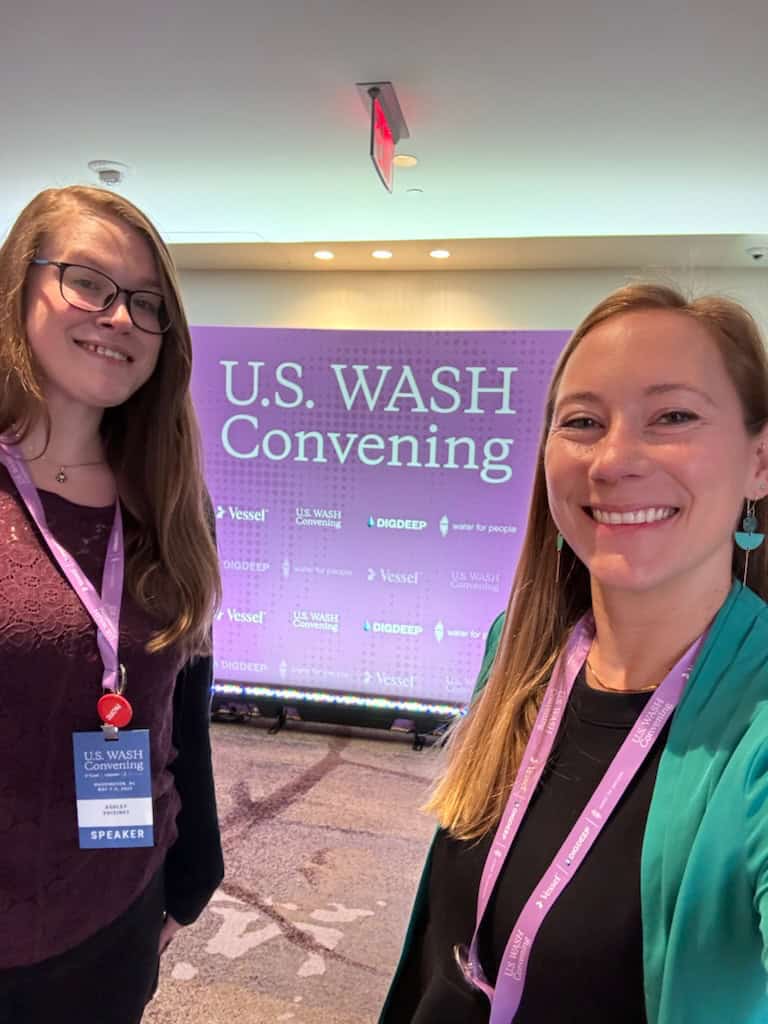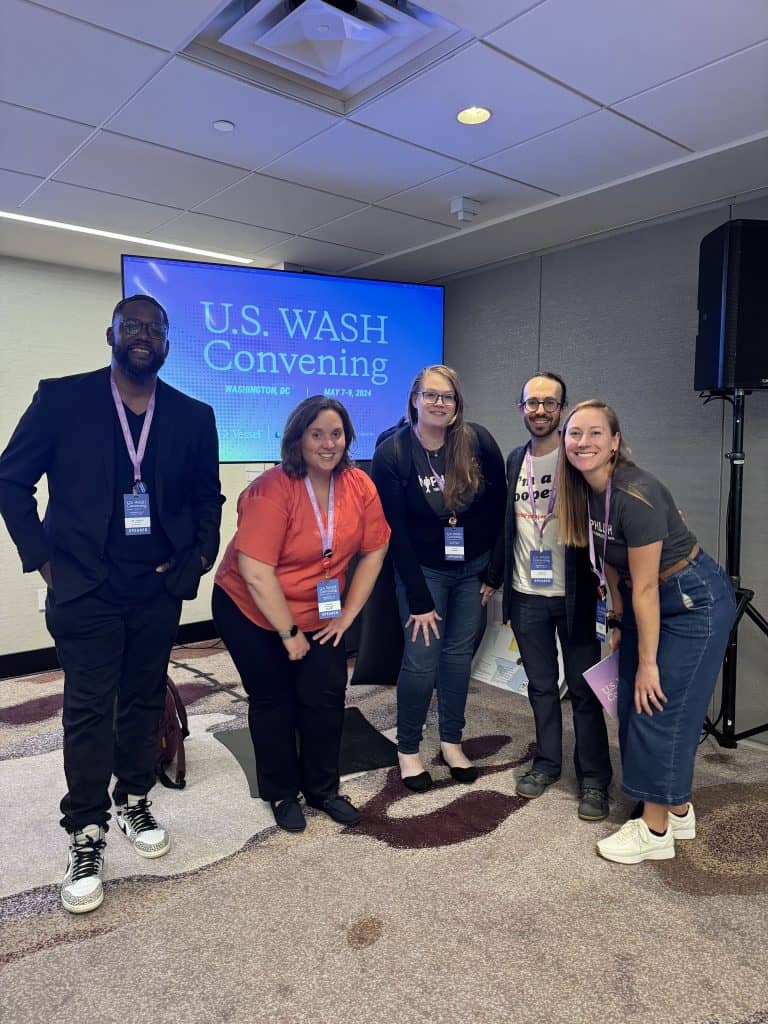A Recap of the U.S. WASH Convening: Part I
In early May, Ashley and Genevieve traveled cross-country for a whirlwind week in Washington DC at the inaugural United States WASH (Water, Sanitation, and Hygiene) Convening! We’d like to thank our friends at DigDeep and Water For People for putting this incredible conference together, including funding for travel and lodging for so many of the attendees. We are so grateful for the opportunity to see and meet so many of our friends, old and new, across the US WASH sector.

Ashley and Genevieve at the U.S. WASH Convening in DC, May 7-9, 2024.
PART I: GENEVIEVE’S REFLECTIONS
It’s really special to have been a part of this inaugural event. As someone who has been volunteering with PHLUSH for over 5 years, I felt this event was the culmination of so much work and personal growth within the WASH space, and it was bursting at the seams with so much positive energy from everyone in attendance. I was there as both a PHLUSH volunteer but also as a representative of my day job with Moonshot Missions, where I work as a Utility Advisor (we provide Technical Assistance to under-resourced water and wastewater utilities access infrastructure funding and increase their technical, managerial, and financial capacity).
I am indebted to my engagement with PHLUSH for educating me on the sanitation issues that many of our nation’s people face, which helped me transition my “daytime career” from for-profit to nonprofit consulting. In some senses, my volunteer advocacy role at PHLUSH is very distinct from my role at Moonshot. But at the Convening, I was reminded and deeply encouraged that all of the spaces within the WASH sector have a lot to learn from each other, the goals within these spaces are intertwined, and there is even room for us to collaborate. For example, one session I attended presented several decentralized treatment solutions that are being used at both a household and neighborhood scale. It was awesome to meet someone at the session interested in implementing decentralized solutions in a public sanitation space (as in urine diversion or composting toilets for public restrooms, or ecological waste treatment systems at a utility scale). It was even more incredible to later learn that they were already collaborating with our board member Hayley on similar work! And that’s the good vibes the WASH sector is all about.
All that being said, I’ll admit there were times when I felt a bit overwhelmed by the WASH issues we are facing as a nation and world. For example, how will we balance the huge cost of water/wastewater treatment as we face emerging contaminants, while keeping water bills affordable? How will we combat the lack of workforce in the WASH sector, as there is a severe shortage of folks entering the water/wastewater workforce? And how can we encourage our society to value WASH in a way that will benefit the greater good?
These are huge questions, and the solutions are unclear. While there is progress being made on the first two questions, the latter is one we dug into during a panel that we participated in with Kim Worsham at FLUSH, Shawn Shafner at The POOP Project (and FLUSH), and Dr. Terrence Lester at Love Beyond Walls. The panel was titled “Building Hygiene into the WASH Conversation for Public Spaces.” In this session, we first tried to define hygiene, which is included in the WASH acronym but very often excluded from the conversation. Hygiene, we concluded, is a complex topic that can be distilled into the formation of healthy and mindful habits. One audience member pointed out that hygiene is the “WHY” for water and sanitation access – we need the latter to achieve the former. The engagement from the audience was great, and we dove deeply into how the value of hygiene is demonstrated in other parts of the world, but lacks in the United States. In the end, although we’d hoped to dive into developing a framework for measuring hygiene, we truly just scratched the surface. With our friends from the session, and any others who are interested, we hope to continue this discussion and start to build that framework so we can have a way to truly frame the conversation of how hygiene is accessed (or not accessed) within various populations across the United States.

Panelists for the session titled “Building Hygiene into the WASH Conversation for Public Spaces,” including Dr. Terrence Lester (Love Beyond Walls), Kim Worsham (FLUSH), Ashley Voisinet (PHLUSH), Shawn Shaffner (The POOP Project/FLUSH), and Genevieve Mancuso (PHLUSH).
The culmination of the Convening was an Advocacy Day, in which participants met with their senators to lobby for the WASH Access Data Collection Act. Being from Oregon, my job was easier than others, considering that both of Oregon’s senators (Ron Wyden and Jeff Merkley) co-sponsored the Act. It was thrilling to be on Capitol Hill with a fellow Oregonian (Adam DeHeer of the Bend-based greywater treatment technology company, Leapfrog Designs) and DigDeep’s George McGraw and Kabir Thatte. Given that a recurring theme throughout the Convening was the lack of data on WASH access in the United States, it felt like a huge win to personally advocate for the Act, which would set aside $10 million dollars to do a targeted survey of United States households to learn about their water and sanitation access needs. With this data, we can know where the pockets of people are that we are unaware need better access, potentially connect folks to the utility grid, or facilitate better decentralized solutions to those who are best suited for it. You can read about the Act here, and write to your senators in support here.

In all, it was a fantastic week of learning from others, sharing perspectives, fostering connection, and garnering inspiration for further action in the U.S. WASH work. So let’s do it together! If you’d like to get involved, please contact PHLUSH or learn about our Partner Organizations.
